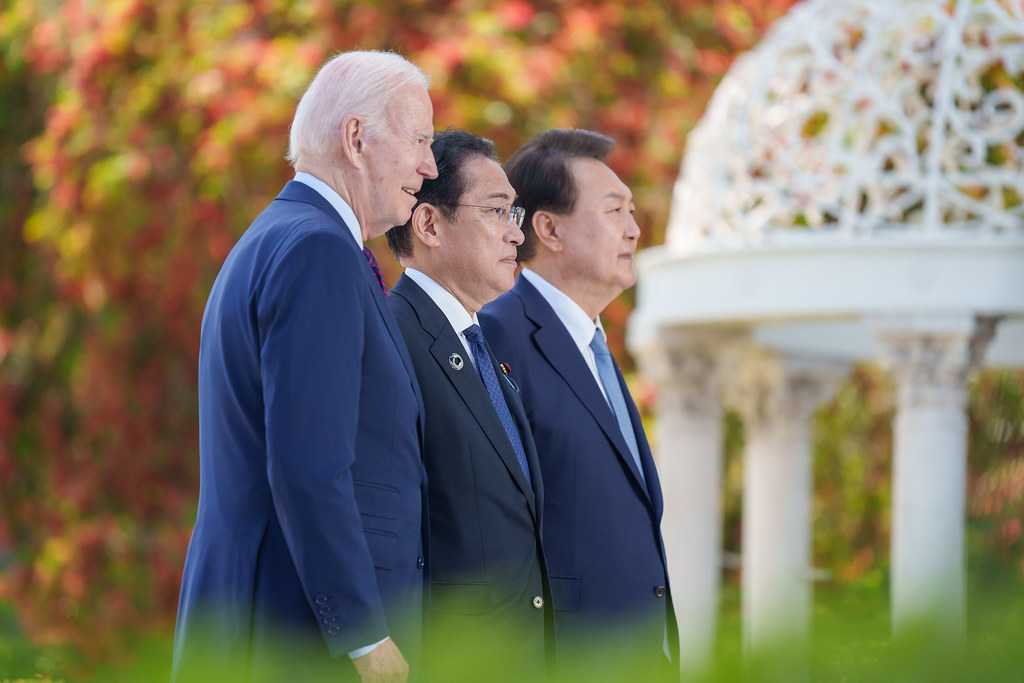In recent public remarks, US President Joe Biden has talked up his foreign policy credentials. “I’m able to keep the Pacific Basin in a position where we’re at least checkmating China now,” Biden boasted in an television interview. He spoke of personally holding NATO together, and following the alliance summit in Washington last week, Biden claimed to have “strengthened the Asia and the Pacific area more than anyone else has.”
On US alliances in Asia, Biden’s claim is undoubtedly true. The US relationship with Australia has been strengthened through AUKUS and force posture initiatives that will increase the US military presence here. Japan is also playing a larger regional and global security role in the context of its alliance with the United States. The Biden administration has coordinated with South Korea on nuclear deterrence and massively ramped up defence ties with the Philippines.
To boot, many initiatives have increased networking between US allies and partners – think the Quad, the “Squad” involving the Philippines, Australia and Japan, and resuscitating trilateral ties with Japan and South Korea. While still far from an “Asian NATO”, greater connections between “spokes” strengthens the US hub-and-spokes alliance system in Asia.
Individually these are impressive achievements. The administration has deep Asia expertise and carries a seriousness of purpose. Collectively, the initiatives amply justify Biden’s claim to have done more than any other recent president to strengthen US alliances in Asia.
Biden’s Asia policy has been strongest in areas of existing American advantage: alliances, defence and northeast Asia. It has been weakest in areas of disadvantage.
Yet Biden is wrong to claim that he has “checkmated China”.
At a basic level, this is a logical error: in the context of countering China, US alliances are tools, not ends in and of themselves.
Consider the South China Sea. China’s campaign of bullying and coercion against the Philippines continues unabated, and despite closer alliance ties with Manila, Washington still lacks either the instruments or the resolve to counter China’s actions.
Or contemplate Taiwan, where much remains to be done to deter China from considering an invasion or a blockade – most experts agree that neither Taiwanese capabilities nor US posture and planning are sufficient.
Or look at economic statecraft, sorely needed if the US is to compete with China on trade and investment with Asian countries. The signature initiative of the Biden administration, the Indo-Pacific Economic Framework, is weak tea. It was never going to offer improved access to the US markets for Indo-Pacific countries. But that’s what the region sees as a priority. Even modest hopes of a digital deal collapsed in 2023 due to competing domestic political pressures in the United States.

By contrast, China is active in the region’s trade architecture and has even applied to join the Comprehensive and Progressive Agreement for Trans-Pacific Partnership, the trade deal salvaged from the Trans-Pacific Partnership negotiations that the US abandoned.
The Biden administration has also pushed on open doors, having success with existing alliance relationships. It’s had fewer wins little to convince the larger group of “non-aligned” countries in Asia, especially Southeast Asia. Upgrading ties with Vietnam to Comprehensive Strategic Partnership – leapfrogging the category of “strategic partnership” and overcoming Hanoi’s longstanding hesitations – hasn’t had an appreciable impact on Vietnam’s wider foreign policy orientation. Vietnam recently hosted Vladimir Putin for an official visit.
In the Pacific Islands region, the US Congress eventually continued funding the Compacts of Free Association, but only after a lengthy delay that caused regional ructions. The deal ensures that the US retains military access to Palau, the Marshall Islands and Federated States of Micronesia. The US also reopened an embassy in Solomon Islands and struck a security deal with Papua New Guinea. But more broadly there has been little sign of delivery of US support for the region that would decisively shore up American influence.
So, Biden’s Asia policy has been strongest in areas of existing American advantage: alliances, defence and northeast Asia. It has been weakest in areas of disadvantage: in redressing the military balance, delivering economic statecraft, and influencing non-aligned countries.
The worrying thing for Australia should be that Biden is probably right in claiming to have done more to strengthen ties in Asia and the Pacific than anyone else. It’s just still not enough to “checkmate” China.

